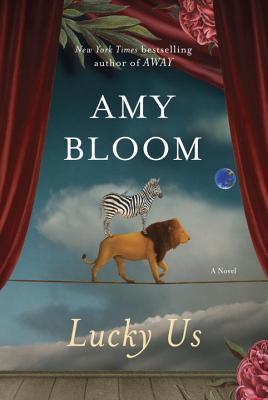 Whoever decided on the title for this book--whether it was Bloom, her editor, publisher, whoever--has a sick sense of humor, because the characters in Lucky Us are lucky only in the sense that they survived infancy. Beyond that, they are perhaps the unluckiest set of people I have ever read about. This book was almost painful to read because just when you thought it couldn't get any worse, it does.
Whoever decided on the title for this book--whether it was Bloom, her editor, publisher, whoever--has a sick sense of humor, because the characters in Lucky Us are lucky only in the sense that they survived infancy. Beyond that, they are perhaps the unluckiest set of people I have ever read about. This book was almost painful to read because just when you thought it couldn't get any worse, it does.The story follows Eva and Iris, half-sisters who share a father. When Iris' mom dies, Eva's mother (the father's mistress) takes Eva to Edgar's (Iris and Eva's father) house and leaves her there. Iris and Eva bond pretty quickly and eventually run away to Hollywood where Iris tries to make it as an actress and Eva plays support. Eventually, a scandal results in Iris being blacklisted from the Hollywood scene, and Edgar tracks the girls down. The family, plus makeup artist Francisco, heads to New York where Francisco found Edgar a job as a butler and Iris a job as a governess for a rich family. Things continue to go wrong, however: Iris falls in love with the family's cook, who happens to already be married; the cook's husband is arrested an interned as a Nazi spy; Edgar's health starts going downhill, fast; and so on. Also involved: a kidnapping and a fatal fire. Throughout it all, Eva supports herself, and later her family, by reading tarot cards and telling fortunes.
I wasn't a huge fan of how the book was composed. Most of the chapters are written in first person, from Eva's point of view. Also interspersed are letters from the other characters to Eva and sections written in third person that focus on the other people. While I didn't mind the inclusion of letters, many of them seemed very strangely written; they were obviously letters written that were to tell the reader backstory, and therefore didn't feel like genuine letters. After all, Eva would have known what had happened to herself and Iris. She wouldn't have needed Iris to write her a letter describing it all, which is exactly what happened. That didn't quite fit to me, and the letters, especially those from Iris, didn't seem to fit with the content of the book. Iris gets really roughed up at one point, and ends up going to England for plastic surgery, and it's apparently a smashing success because she writes about her life like she's super pretty and everything is awesome, but according to the rest of the narrative she was terribly disfigured and I'm skeptical of how well plastic surgery would have gone in the mid 1940s. I certainly don't think it would have been enough to restore her looks to the starlet ones she had before. I also didn't like the third person bits, because while the things that happened in them were interesting, they jarred me out of the narrative.
ALSO this book involves lesbianism!!! Very prominently!!!! Iris realizes her sexuality as a lesbian relatively early on (there is a lesbian orgy in this book, guys; not a very explicit one, but still) and has two major relationships with other women (none with men) throughout. This seemed to be remarkably well accepted, considering the time period; I would have thought there would have been a lot more stigma attached to a homosexual relationship in the 1940s, though female homosexual relationships have never been frowned upon quite to the degree that male ones have been. Anyway, it was cool to see a non-straight character in a historical fiction, and especially one where her sexuality is an element of the plot but is not the main thing driving it. So many books that involve non-straight characters can become completely about the character's non-straight identity, and this one didn't do that. Which was good, because there is always more to a person than their sexuality, and Iris was no exception.
One more thing: this book is full of terrible people. Pretty much all of the main characters (with the exception of Francisco) do terrible things at one point or another, Iris most notably of all. This made them hard to like, and almost made you feel like they deserved all of the hardships that came their way which....might have been the point? I'm not sure. I liked Eva, overall, but even she facilitated a kidnapping at one point, which obviously is not good. Some of their actions were very jarring for protagonists, because protagonists are supposed to be easy to identify with, and I didn't find Eva or Iris that easy to empathize with. I can't imagine kidnapping someone or reporting someone as a spy so that I could hook up her husband; it just doesn't work in my mind, and it alienated me from Eva and Iris quite a bit.
And can we talk, briefly, about how that cover has nothing to do with the book? Nothing. At all.
Overall, 3 stars out of 5. It was short but complicated, and not necessarily in a good way...the end somewhat made up for the other bits, but not entirely.
No comments:
Post a Comment